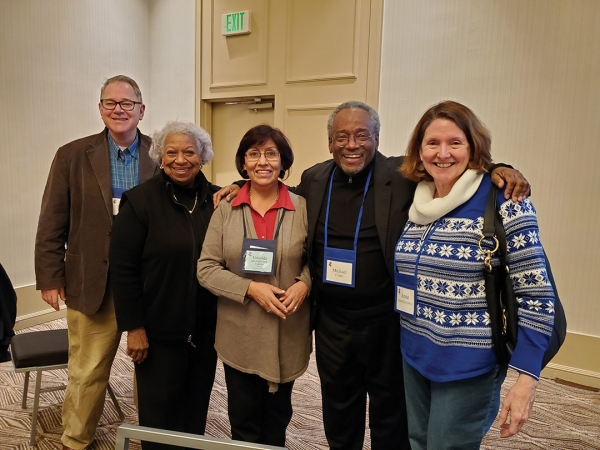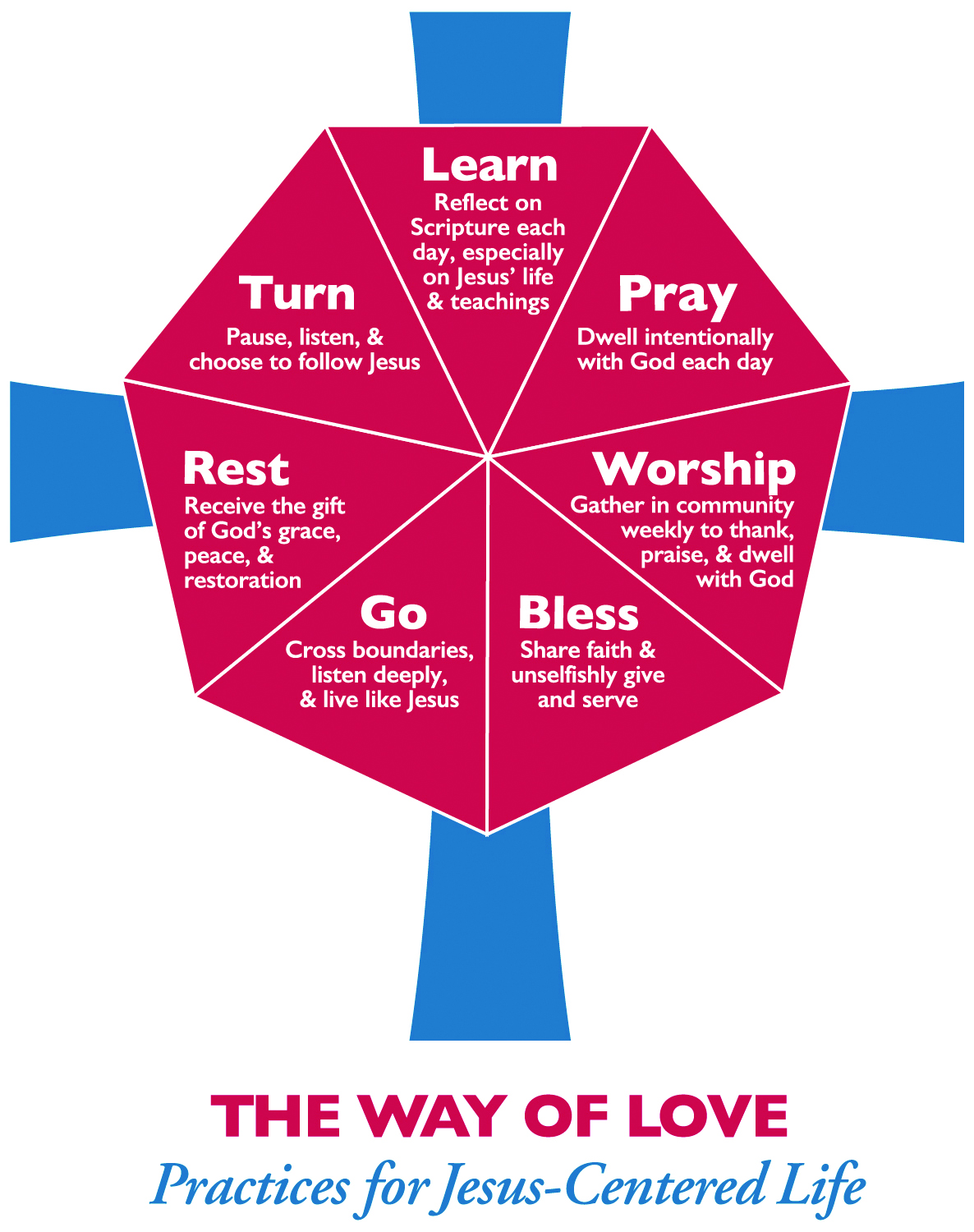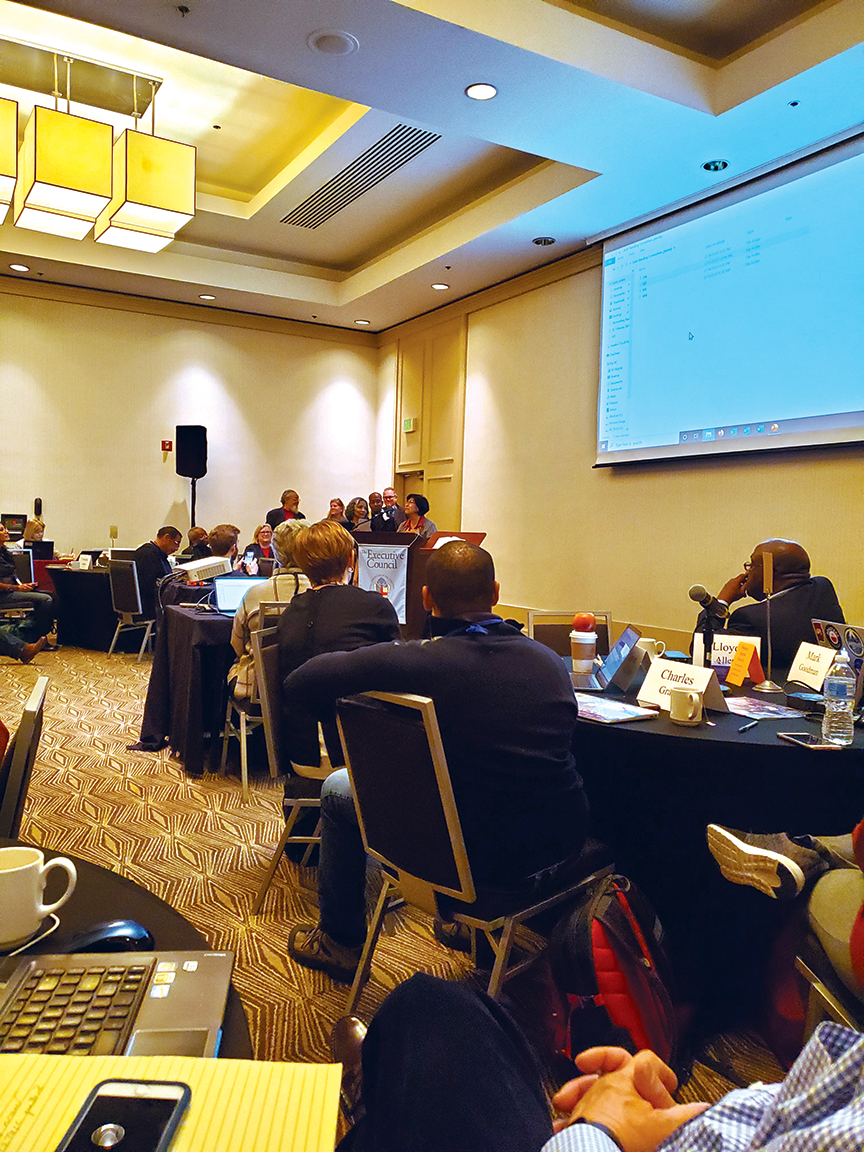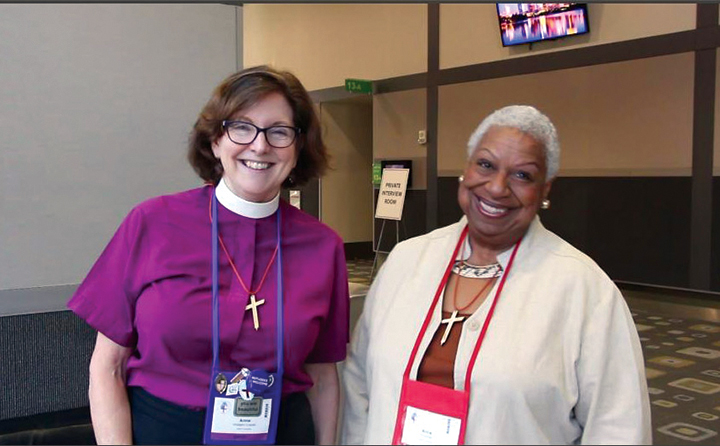Disciple: Checking in with the Church

An interview with two Executive Council members from the Diocese of North Carolina
Executive Council is the national governing body of The Episcopal Church. Formally, it is the Board of Directors of the Domestic and Foreign Missionary Society, the legal name of the Church. Currently comprised of 38 members plus ex officio members, Executive Council includes 20 representatives elected by General Convention and 18 from across the nine provinces of the Episcopal Church.
Two of those representatives hail from the Diocese of North Carolina. The Rt. Rev. Anne Hodges-Copple, bishop suffragan of the Diocese, and Alice Freeman, representative of Province IV (the province of which the Diocese of North Carolina is a part), are both midway through their six-year terms. They were kind enough to sit down with us to share some of the work of Executive Council, their experiences being a part of it and their thoughts on the state of the Church.
[Image: At the Executive Council meeting in February 2020, Alice Freeman (second from left) and the Rt. Rev. Anne Hodges-Copple (far right) posed with the Rev. Canon Michael Barlowe, secretary of General Convention; the Rt. Rev. Griselda Delgado del Carpio, bishop of the Episcopal Church in Cuba; and the Most Rev. Michael Curry, presiding bishop of The Episcopal Church. Photo courtesy of Alice Freeman]
What does Executive Council do?
Alice Freeman (AF): Executive Council is a governing body, and its members carry out the program and policies adopted by General Convention. There are 20 committees and commissions of Executive Council to do the work, four of which are standing committees: Finance, Governance and Operations, Mission Beyond the Episcopal Church and Mission Within the Episcopal Church. We meet about three or four times a year in different parts of the country, though we’ve been meeting virtually since the pandemic started.
AF: There are two ways to be elected. One is when the nominating committee puts out a call for those people interested in serving to apply. Applicants then go through a formal application process, which is followed by a committee that evaluates all of the applications and submits nominees to General Convention to stand for election.
The second way is that each of the nine provinces is allowed one clerical member and one lay person to represent that province. I chose to apply via both paths. I wanted to be a voice for people who may not have a voice. Someone once said, if you’re not at the table, chances are you are on the menu. So I wanted to do this and be at the table, and I was elected through the Province IV path.
The Rt. Rev. Anne Hodges-Copple (AHC): I was approached through the House of Bishops and asked if I would be willing to apply and put my name forward. I naively said yes because I was a relatively new bishop when General Convention convened in 2018 and didn’t think people knew who I was. There are always more qualified, wonderful, good and faithful people running, and I was sure I’d never be elected. And then I was.
I kind of laugh and feel like the joke is on me in some ways, but I also feel that God’s blessing is upon me because, even though it was something I had not anticipated being part of, I have been hugely blessed, hugely surprised and hugely delighted to work with the other members of Executive Council, who really, I think, represent some of the best and the brightest of leadership in the Episcopal Church.
On what committees do you serve?
AF: I serve on the Mission Beyond the Episcopal Church committee. Our mandate is to highlight issues in the development of ministry beyond the Episcopal Church with special focus on global partnerships. We also tend to Anglican Communion covenant committees—we have covenants with several dioceses around the world and bilateral relationships, Episcopal Migration Ministries, inter-religious partnerships, domestic government policy through the Office of Government Relations, international policy, social international policy and social justice work, and Episcopal Relief & Development.
AHC: I serve on the Finance Committee, which, though it obviously entails looking at financial spreadsheets and budgets all the time, is really a very mission-oriented group. The finances are broken into two divisions: the Mission Beyond and the Mission Within. So I actually work closely with the committee on which Alice serves. We’re working on the budget for the next triennium, and the committee looks very carefully and asks a lot of questions because that accountability actually raises the bar for knowing if we are being impactful, if we are living up to our priorities in our values, and if there are things we can learn and maybe let go if they worked in their day but are not working as well now.
One of the things we never want to do is cut money from something that’s being impactful, and we don’t want to spend money on things that aren’t impactful, especially if we can redirect it to things that are impactful.
For instance, when we came up against COVID, we started meeting weekly because there were things we knew we would have to do and things we could do. We cut the travel budget and put a hiring freeze in place, and a freeze on most expenses because we didn’t want to have to lay off anybody. Through such line-by-line cuts, we were able to save hundreds of thousands of dollars. With the impact of Payroll Protection, we kept people employed. With these combined efforts and by dipping into some reserves, we eventually were able to redirect hundreds of thousands of dollars into COVID relief grants for almost every diocese in the Episcopal Church, with a minimum of strings attached. We were able to provide relief to every single diocese that requested it, with very broad parameters so they could use the funds in whatever way they needed to in order to make the most impact in their dioceses.
How is the Episcopal Church doing as we move through a pandemic world?
AF: Executive Council is guided by how we follow the way of Jesus. Every day, there are seven things we can do to guide us: turn—pause, listen and choose to follow Jesus; learn—reflect on Scripture each day, especially Jesus’ life and teachings; pray —dwell intentionally with God each day; worship—gather in community weekly to thank, praise and draw near God; bless—share faith and unselfishly give and serve; go—cross boundaries, listen deeply and live like Jesus; and rest—receive the gift of God’s grace, peace and restoration.
 That sounds an awful lot like the Way of Love!
That sounds an awful lot like the Way of Love!
AF: That is exactly the Way of Love, and that is exactly what the Church is right now.
AHC: I agree with that. I think it’s the message of the Episcopal Church—of what we stand for and what we’re pursuing, and the values that guide us and the actions we take. In light of the values that guide us and the spiritual practices we’re committed to, I think that is being presented beautifully across all kinds of interconnected communications channels. Certainly Presiding Bishop Curry is a huge part of that, but we are really, in some ways, singing out of the same song book with the Way of Love, with Becoming Beloved Community, with the Jesus Movement. I don’t remember a time in the Episcopal Church when we’ve had a more unified message that is so compelling.
That said, we cannot deny or turn away from the fact that membership in the Episcopal Church continues to decline. When you look at the demographics and how they break out along age ranges, baby boomers make up the largest percentage. We’re also still an overwhelmingly white church, although that is shifting some. The thing that alarms me most is that we’re losing ground with millennials, though that is not at all unique to the Episcopal Church.
I think we have to recognize that there are a lot of ways the Church needs to change. There is much we love about it, but there’s much that we are confronting within the Church, and probably the greatest work Executive Council has done to confront the work we need to do is the racial justice audit that’s been conducted with leaders across the Church. We have to make our own Body healthier, and we recognize that the sin of racism inhibits the health of the Body, so the Body can’t grow the way it needs to. The Executive Council spends a lot of time in our meetings on topics related to racial reconciliation. Millennials and the generations coming behind them are very committed to racial and social justice, and they need to see that message coming from the Church.
AF: Young people I’ve spoken to have an aversion to formal religion, though they say they are spiritual. They don’t think we’ve done so well as a religion. There are so many issues that are important to them that have not been addressed by religious faiths and practices, and they are disillusioned. And so we have to find ways to meet their needs because their questions are really about the institution, not about faith.
It is a tremendous commitment to serve on Executive Council and undertake the work you do. What about the work inspires you?
AF: Feeling like I can make a difference. A lot of people sometimes can’t speak up because they have obligations or are afraid of retribution in some way. I’m in a place where I am not beholden to anyone, except to me and my God. And I have to do what I feel like I have to do. And while that is painful sometimes, it is what I feel I’m called to do. No matter how I try to dismiss it.
AHC: What inspires me about this work are the other members of Executive Council. I am constantly inspired by the thoughtfulness of the debates and the conversations. I am inspired by the dedication that people have and the work that they do to have robust, honest, good debate.
I’m inspired because I know when I go to Executive Council, I’m going to see, hear and learn things that are going to deepen my commitment to Gospel-based living. It’s the process of deeply engaged leadership reflecting, discerning, deciding and going forth in faith that inspires me to go back to my work of the Diocese and do the same thing. It gives me hope and encouragement that what’s happening at the grassroots level in any one diocese is truly interesting and important and valued. It’s tiring, and it also gives me energy, and I think that’s the definition of inspiring.
AF: Not only is the current Executive Council the most ethnically and gender-diverse Council ever assembled, we also have a mix of conservatives, moderates and liberals. Which, I think, is representative of both our Church and our country. When you bring all of those factions together and they are able to debate civilly and congenially, that is important.
 Though Becoming Beloved Community is defined in different ways between the Episcopal Church and the Diocese of North Carolina, what are some of the other ways the work of Becoming Beloved Community has manifested in the work of Executive Council, in addition to the work of racial justice you’ve described?
Though Becoming Beloved Community is defined in different ways between the Episcopal Church and the Diocese of North Carolina, what are some of the other ways the work of Becoming Beloved Community has manifested in the work of Executive Council, in addition to the work of racial justice you’ve described?
AHC: An example is the Rapid Response Becoming Beloved Community grants. There are two types of Becoming Beloved Community grants: there are the regular Becoming Beloved Community grants and then the Rapid Response Becoming Beloved Community grants. Executive Council and General Convention have been able to make available grants for some of our work around racial reconciliation, to take place in very local, grassroots ways that apply to contexts as diverse as Pittsburgh, Navajoland, Alaska, Honduras—you know it’s going to look different according to where it’s planted and in which part of the vineyard.
[Image: A session of Executive Council meets. Photo courtesy of Alice Freeman]
AF: The advisory group overseeing the Rapid Response Becoming Beloved Community grants of up to $10,000 came up with implementation authorizing a special grant cycle to address systemic racism and racial violence in urgent areas. They might be applied to the racial disparities laid bare by the coronavirus pandemic, which disproportionately affects people of color in terms of health outcomes. There’s also the pandemic of ongoing violence directed against Black people and other people of color, especially at the hands of law enforcement personnel in communities in the Americas and beyond.
All proposed budgets and all proposed projects must demonstrate adherence to relevant local diocesan and state public health guidelines for gathering. Interaction programs address the health consequences of ongoing racism for communities of color, talking about things like depression, anxiety, substance abuse and trauma recovery. Community listening and learning sessions offer speakers series on racial reconciliation, workshops, facilitated training and other activities that promote the work of the law becoming the loving.
Let me give you an example. In the Diocese of South Carolina, All Saints and the local internet provider agreed to pay for the students who could not afford internet when the school shut down due to the COVID pandemic. They provided funds for 183 families through March and April 2020, but the provider wouldn’t support it beyond that, so All Saints requested and was awarded a grant to pay for some of these high school students to continue having internet for the 2021 school year.
Another example: In Tucson, Arizona, COVID has caused severe economic impacts to the large immigrant and refugee communities whose poverty rate is 10 points above the national U.S. average. A parishioner at St. Philip’s, a part-time teacher, recognized the opportunity created by the demand for face masks, created a pattern, sourced materials and created a program she called THREAD (Together for Hope, Reconciliation, Empowerment and Development) that offers mothers of the immigrant students in the school where she works the chance to help make the masks, helping them earn income while remaining safe. A $5,000 Rapid Response Becoming Beloved Community grant was part of that happening.
AHC: There’s no way to list for an article all of the grant funds that have been distributed, the ministries they supported, the impact they’ve had or even all of the grants available. But part of our work going forward is making sure the opportunities and how to take advantage of them are clear so we can make sure applications are received and funds dispersed in an equitable way, so the variety of opportunities for building beloved community can be supported as broadly as possible.
 How do you see the mission priorities of the Diocese of North Carolina reflected in the work happening in the Episcopal Church? Is it aligned well?
How do you see the mission priorities of the Diocese of North Carolina reflected in the work happening in the Episcopal Church? Is it aligned well?
AHC: I think that, particularly in the mission strategy, our priorities and our focus are aligned very well with the Episcopal Church. Becoming Beloved Community, Christian formation, creation care, new communities—we haven’t even had a chance to talk about those yet! The Episcopal Church is devoting a lot of time, energy and resources to planting and developing new communities, and that idea that we need to grow churches differently than we have in the past is very much aligned up and down with our own. It doesn’t hurt that our presiding bishop was once the bishop of our own diocese and is now saying things we’ve been hearing for a long time on a wider platform.
[Image: The Rt. Rev. Anne Hodges-Copple and Alice Freeman celebrate Hodges-Copple’s election to Executive Council during the 79th General Convention. Photo by Christine McTaggart]
AF: I think we’re lining up pretty well. I think leadership is key. And I think the Diocese of North Carolina is ahead of the Episcopal Church in some ways, especially in our efforts around racial justice and reconciliation. I think the Executive Council is getting on board more and more with work that’s been happening here for a while. I think the foresight of our diocese is ambitious. I’m very impressed with what I’ve seen of the developing mission strategy. With the leadership we have in place, we are poised to do some good things and to move some things forward.
Follow the work of Executive Council at bit.ly/InfoExecutiveCouncil or subscribe to Please Note for headlines from Executive Council meetings. Or keep reading the Disciple, as our conversation with Alice Freeman and the Rt. Rev. Anne Hodges-Copple only began to tell the story of the work happening. There’s more to come!
Tags: North Carolina Disciple
